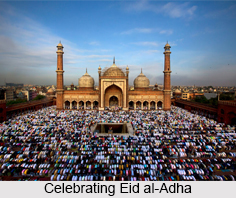 Eid al-Adha also known as the Festival of the Sacrifice is celebrated on the 10th day of Dhu al-Hijjah as per the lunar Islamic calendar. The festival is celebrated following the completion of the annual holy pilgrimage of Hajj. After Eid ul-Fitr, this is one of the holiest Islamic holidays that is celebrated worldwide each year.
Eid al-Adha also known as the Festival of the Sacrifice is celebrated on the 10th day of Dhu al-Hijjah as per the lunar Islamic calendar. The festival is celebrated following the completion of the annual holy pilgrimage of Hajj. After Eid ul-Fitr, this is one of the holiest Islamic holidays that is celebrated worldwide each year.
Etymology of Eid al-Adha
Having both Persian and Arabic connotations, the word Eid means a festival or celebration and Adhan means a sacrificial animal. Thus, Eid al-Adha means a Feast of the Sacrifice.
Origin of Eid al-Adha
The festival of Eid al-Adha honours the willingness of Ibrahim or Abraham, an Islamic Prophet of the Lord, to sacrifice his son as an act of obedience to the will of God. In Judaism, this story is known as Akedah and originates in the Tora, the first book of Moses. This was one of the main trials in the life of Abraham to sacrifice his dearest possession, his son, who is not identified in the Holy Quran, but the earliest Islamic traditions identify him as Ishmael.
Abraham was prepared to carry out God"s command and when Satan tried to dissuade him, he and his family drove Satan away by throwing pebbles at him. In commemoration of their rejection of Satan, stones are thrown at symbolic pillars as a part of Hajj rites called the Stoning of the Devil. When Abraham finally went to sacrifice his son, God provided a lamb to sacrifice instead, which signified that one should never sacrifice a human life, especially not in the name of God. To commemorate this sacrificial act, an animal is sacrificed and divided into three parts: one part of the share is given to the poor and needy; second part is for the home, third is given to relatives. Muslims commemorate this ultimate act of sacrifice every year during Eid al-Adha.
Religious Practises of Eid al-Adha
During Eid al-Adha, prayers are offered at mosques and the takbir is chanted out loud before the Eid prayers. After offering prayers, distributing meat amongst the people are an essential part of the festival of Eid al-Adha. The Eid prayer is held in a large congregation, where the devotees are dressed in their finest clothing. After the prayers, the devotees sacrifice their halal domestic animal as a symbol of Abraham"s willingness to sacrifice his own son. In Arabic, the sacrificed animal is called adhiya, and has to meet a certain standard of approval like age and quantity to be deemed as acceptable. The festivities end with eating delectable shortbread cookies called ma"amoul and exchanging gifts among friends and family.



















